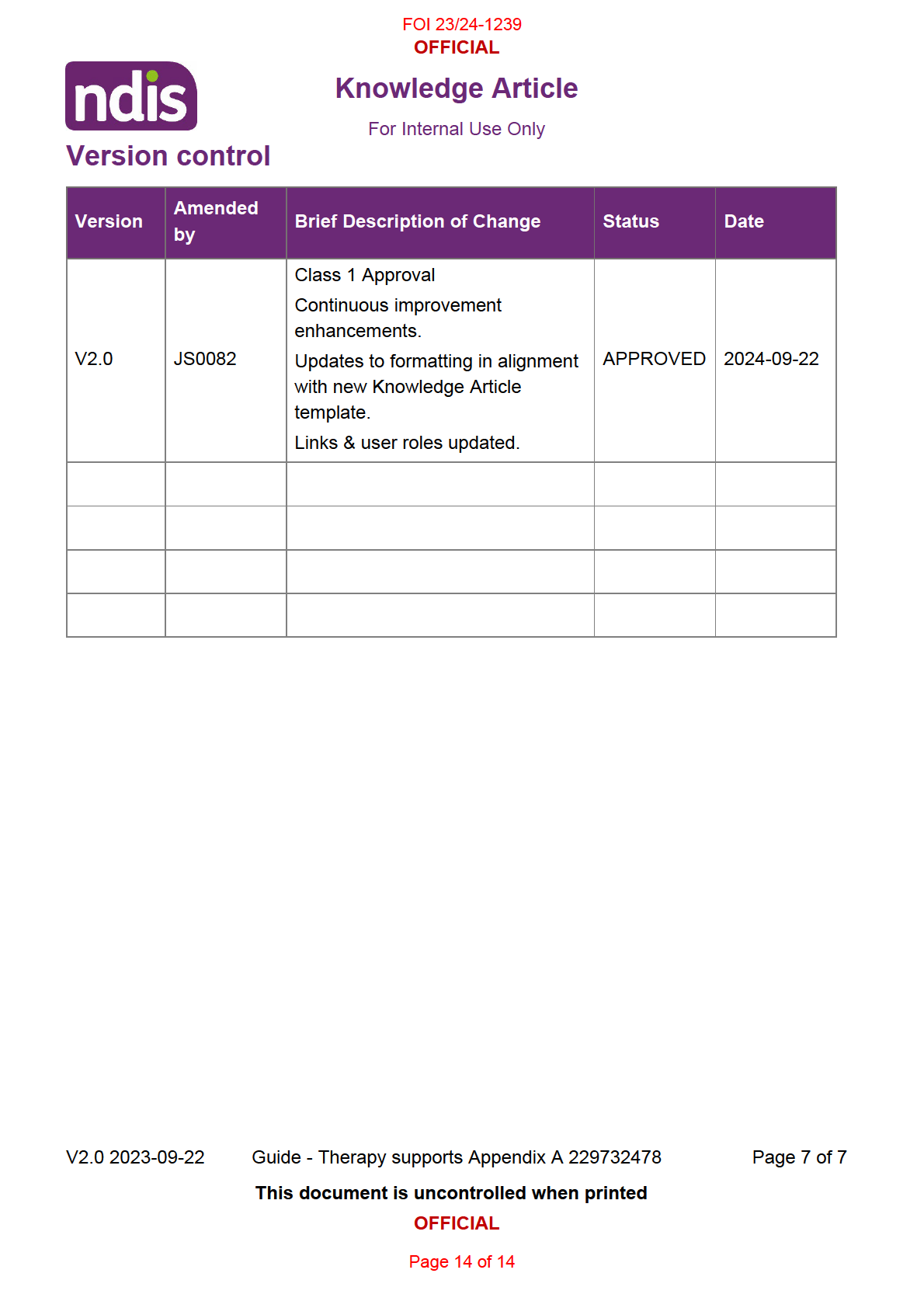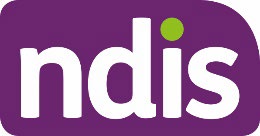
FOI 23/24-1239
DOCUMENT 1
OFFICIAL
Knowledge Article
For Internal Use Only
The contents of this document are OFFICIAL.
Guide - Therapy supports
Guidance in this document is not approved for use unless you view it in PACE.
This article provides guidance for a planner delegate, review officer, local area coordinator,
early childhood partner, technical advisors, liaison officers (HLO/JLO) or complex support
needs (CSN) planner to understand:
• what are therapy supports
• the role of allied health professionals
• assessments and reports
• capacity building – Improved Daily Living Skil s.
This guide is for participants 7 and older. For information about capacity building supports for
children younger than 7, go to article EC: PEC – Capacity Building – Early Childhood supports
overview.
Recent updates
6 May 2024
Update to include the age range this guide applies to.
Before you start
You have read and understood:
• Our Guideline – Reasonable and necessary supports (external)
• Our Guideline – What principles do we follow to create your plan? (external)
• Our Guideline – Mainstream and community supports (external).
What are therapy supports?
Therapy supports assist participants to develop skil s to build independence in the home,
community, place of education and work.
The goal of capacity building therapy supports are to build or maintain the participant's
independence, meaning that the need for future therapy support wil generally reduce over
V3.0 2024-04-24
Guide - Therapy supports 229732421
Page 1 of 7
This document is uncontrolled when printed
OFFICIAL
Page 1 of 14
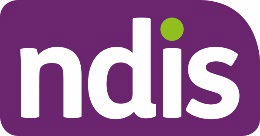
FOI 23/24-1239
OFFICIAL
Knowledge Article
For Internal Use Only
time. Some participants may need ongoing maintenance supports, for example, if they have a
condition that is unlikely to change or wil degenerate over time.
There may be instances where therapy supports remain the same or increase. Some
examples include:
• the participant has not progressed as expected
• a change in situation
• the participant had difficulty attending sessions.
There are many systems apart from the NDIS which provide supports and services. We call
these systems mainstream supports, and they are available to everyone across Australia.
Participant plans might include some therapy supports funded by us, and some funded and
delivered by a mainstream or community service such as the health system. If we're
responsible for funding the support, it must meet all the NDIS funding criteria before we can
include it in the plan.
Maintenance supports
Maintenance supports are used to assist the participant to maintain their current capacity,
achieve small incremental gains or prevent further decline. Maintenance supports can be
provided through a 'delegated' model. This means that the therapist can train family or staff to
provide support to the participant to implement strategies on a more regular basis. You should
discuss using a delegated model of maintenance care with the participant.
When using a delegated model, the therapist wil regularly reassess the participant's
maintenance program to make sure it continues to meet their needs. They may need to adjust
a program or update training to the participant and their supports.
Requests for maintenance supports should be supported by an assessment or report that
includes recommendations of supports and how the participant wil be linked to additional
informal, community or mainstream supports to help them to pursue their goals.
The role of Allied Health Professionals
Al ied health professionals (AHPs) provide therapy supports in their specialist area. They
develop strategies to improve outcomes for participants in areas including:
• mobility
• movement
• personal and social well-being
V3.0 2024-04-24
Guide - Therapy supports 229732421
Page 2 of 7
This document is uncontrolled when printed
OFFICIAL
Page 2 of 14
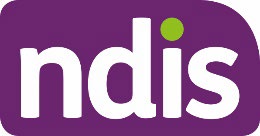
FOI 23/24-1239
OFFICIAL
Knowledge Article
For Internal Use Only
• managing diets and nutrition
• organisation
• communication
• self-care
• cognitive capacity
• social skills
• moods and emotion
• modifying the environment to make it more accessible.
AHPs may also prescribe assistive technology. To learn about assistive technology, go to
article Record assistive technology information and Our Guideline – Assistive technology
(external).
AHPs may be, but are not limited to, occupational therapists, psychologists, speech
pathologists, physiotherapists, exercise physiologists, prosthetist or orthotists, podiatrists,
dieticians or respiratory therapists.
Individuals may be treated by one or more AHPs from different specialisations at the same
time to optimise benefits and outcomes of therapy. They can work in a multidisciplinary team.
When we say multidisciplinary team, we mean a team of professionals who work with one
another and share the job of evaluating, planning and providing therapy services to the
participant.
T
o learn more about AHPs and what therapy support they may provide, go to article Guide –
Therapy Supports Appendix A.
Assessments and reports
You wil need guidance from suitably qualified AHPs on the amount of therapy supports that
the participant wil need to pursue their goals. You can get this information through
assessment or progress report documents provided by the participant. This wil help you
determine if the request for therapy supports meets the NDIS funding criteria.
When you need further evidence to make a decision on supports, you can ask the participant
to have an assessment.
Before asking the participant to have an assessment you need to:
• review all existing information and determine that additional evidence is needed
• consider the costs and benefits of the request
V3.0 2024-04-24
Guide - Therapy supports 229732421
Page 3 of 7
This document is uncontrolled when printed
OFFICIAL
Page 3 of 14
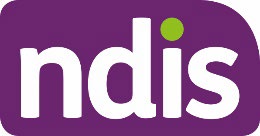
FOI 23/24-1239
OFFICIAL
Knowledge Article
For Internal Use Only
• consider how it wil assist you to decide whether to approve funded supports
• determine the type of assessment that is likely to produce the information you need
• specify the information to be provided in the assessment
• make sure the request aligns with the objects and general principles in the NDIS Act.
When you request an assessment for therapy supports, make sure you include funding for the
assessment.
Requests should clearly specify the functional area to be assessed. Some examples are
communication, activities of daily living, balance and mobility.
Make sure you are clear about the information you need in the assessment. For example:
• how the therapy support wil build or maintain the participant's independence
• how the participant's informal, community and mainstream supports wil help them to
achieve their goals
• how the gains or outcomes wil be measured
• the expected time the participant wil need to achieve the outcome
• the NDIS contact person to forward the information to.
Progress reports
A progress report should include:
• a summary of the supports provided
• how the support has helped the participant work towards their goals
• the measurable gains the participant has made since receiving therapy supports
• how the participant has been linked to additional informal, community or mainstream
supports to help them pursue their goal
• any barriers encountered and how these have been resolved
• any risks to the participant or others.
Progress reports should also include information on how any proposed supports wil further
increase independence and the risks or impacts on other supports.
If the report does not have enough information to justify continued support at the same level or
an increase in support, you should talk to the participant about providing more information.
Capacity building – Improved Daily Living Skills
V3.0 2024-04-24
Guide - Therapy supports 229732421
Page 4 of 7
This document is uncontrolled when printed
OFFICIAL
Page 4 of 14
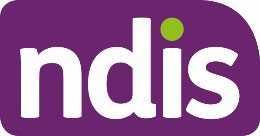
FOI 23/24-1239
OFFICIAL
Knowledge Article
For Internal Use Only
The frequency of therapy wil depend on the participant's individual circumstances. When
making a reasonable and necessary decision about the therapy supports to include in the
participant's plan, use the following information:
• the participant's knowledge and experience with how therapy supports interact with their
condition
• assessments
• reports
• published information about the therapy supports such as the TAB digest or research
journal articles.
Al information is important in determining if the support meets the NDIS funding criteria.
Where information from all 4 information sources doesn't match, talk to your line manager. If
you are stil uncertain, create a technical advice case for the Technical Advisory and Practice
Improvement Branch (TAPIB). To learn more, go to article Create a technical advice case.
Value for money
Value for money considers:
• whether a support wil represent value for money over time
• the cost of other available supports that can help the participant reach the same goal.
When determining if therapy supports are value for money, consider:
• If investing in therapy supports early is likely to have the long-term benefit of significantly
improving life stage outcomes for the participant or reducing their support needs. For
example, is it likely that the use of therapy supports for early intervention wil increase the
participant's independence and decrease reliance on supports throughout life?
• If investing in therapy supports is likely to reduce the participant's support needs in the
short and medium term. For example, wil increasing the participant's independence in
self-care reduce the amount support worker hours needed each day?
• If investing in the support wil delay the need for, or avoid reliance on, additional
supports. For example, wil maintenance therapy delay the functional impact of a
degenerative condition allowing the participant to maintain independence for longer?
• Whether there are similar supports that would have the same outcome at a lower cost.
V3.0 2024-04-24
Guide - Therapy supports 229732421
Page 5 of 7
This document is uncontrolled when printed
OFFICIAL
Page 5 of 14
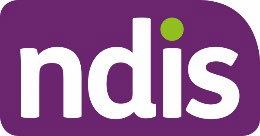
FOI 23/24-1239
OFFICIAL
Knowledge Article
For Internal Use Only
What if I decide not to include all of the AHP recommendations?
The AHP providing the assessment or report is a qualified professional who has met and
worked with the participant.
There may be times when you do not believe the supports the AHP recommends meet the
NDIS funding criteria. Some reasons may include:
• information conflicts with other reports or information you collect during the planning
conversation
• support hours requested are higher than expected
• supports requested may not be considered best practice
• supports requested may not seem value for money.
When this happens, you need to:
• review all reports and supporting information
• review your conversation with the participant
• speak to the AHP to get more information and discuss any differences
• seek advice from your team leader.
You wil then be able to develop a plan that includes the reasonable and necessary therapy
supports.
When you make a decision to include supports in the participant's plan that are different to the
AHP's recommendations, you must write a clear justification detailing:
• the reason the supports recommended do not meet the reasonable and necessary
criteria
• evidence to support this decision (for example, consultation with your team leader or
TAPIB advice)
• what other lower cost/alternative supports were considered.
Go to articles Add budget justifications and Change the draft budget.
Article labels – internal use only
PACE user role names
Add: User role name label
V3.0 2024-04-24
Guide - Therapy supports 229732421
Page 6 of 7
This document is uncontrolled when printed
OFFICIAL
Page 6 of 14
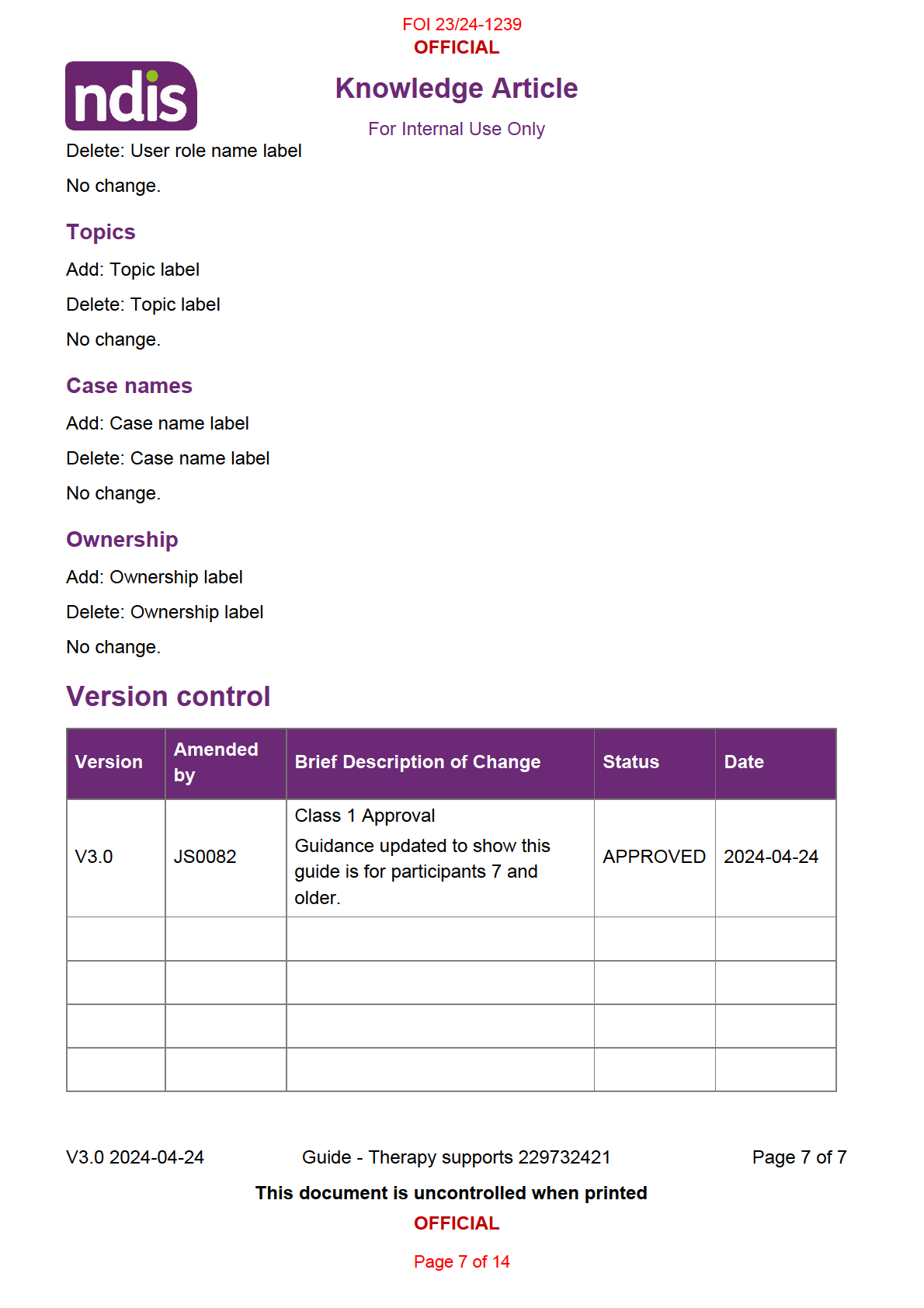
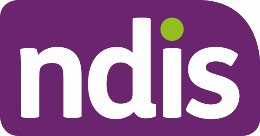
FOI 23/24-1239
DOCUMENT 2
OFFICIAL
Knowledge Article
For Internal Use Only
The contents of this document are OFFICIAL.
Guide - Therapy supports Appendix A
Guidance in this document is not approved for use unless you view it in PACE.
This article provides guidance for a
planner delegate, internal review delegate, national
reassessment delegate, local area coordinator, early childhood partner, technical
advisors, liaison officers (HLO/JLO) or
complex support needs (CSN) planner to
understand the definitions and assessments of therapy supports provided by:
• Al ied Health Professionals
• Allied Health Assistants.
Recent updates
October 2023 This guidance comes from the Practice Guide – Understanding Therapy Supports. We've
made minor updates to change any NDIS Business System language to PACE language. We'll
make improvements to this guidance in the future.
Before you start (optional)
You have read and understood:
• Our Guideline - Reasonable and necessary support (external)
• article Guide – Complex Support Needs (CSN) Pathway.
Allied Health Professionals
Al ied health professionals (AHPs) hold a university qualification, specialise in different areas
and work directly with the person requiring support. AHPs are not part of the medical, dental or
nursing professions.
AHPs assess, prevent, diagnose and treat a range of conditions and il nesses to help people:
• develop skil s and abilities to manage their disabilities
• become more independent
• become healthier and more active
• increase function to build capacity.
V2.0 2023-09-22
Guide - Therapy supports Appendix A 229732478
Page 1 of 7
This document is uncontrolled when printed
OFFICIAL
Page 8 of 14
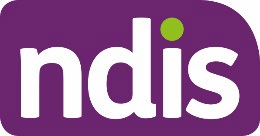
FOI 23/24-1239
OFFICIAL
Knowledge Article
For Internal Use Only
AHPs can work with participants to provide supports funded by us, as well as those funded
and delivered by a mainstream or community service such as the health system.
Dietitian
Dietitians support people to maintain or improve their health and wellbeing through nutrition
and dietetics. Doctors may refer individuals to dietitians to help them with specific health
conditions and to address nutritional concerns which may include weight, nutritional
deficiencies and other diet related conditions. Dietitians provide evidence-based nutrition
services, dietary counselling and therapy.
Refer to the Dietitians Association of Australia for more information. Dietitians can support
NDIS participants with Disability Related Health Supports. For further information refer to the
Our Guideline – Nutrition supports including meal preparation.
Exercise Physiologist
Exercise physiologists assess people who have existing, or are at risk of developing, medical
conditions or injuries. Exercise physiologists are different to personal trainers. Personal
trainers work with people to improve their physical fitness in order to stay healthy. Exercise
physiologists treat medical conditions or injuries using exercise-based interventions that may
include health and physical activity education, advice and support.
Refer to the Exercise and Sports Science Australia for more information.
Music Therapist
Registered Music Therapists (RMTs) have a university degree in music therapy. They are
registered and abide by the Australian Music Therapy Association Code of Ethics.
Music therapy is different to music lessons. RMTs use research-based practice and work as
part of a multidisciplinary team to assist people with communication, motor skil s, mobility,
mood, emotions, cognitive capacity, identity and self-confidence. Music therapists always work
with other AHPs and would not generally be funded in isolation.
V2.0 2023-09-22
Guide - Therapy supports Appendix A 229732478
Page 2 of 7
This document is uncontrolled when printed
OFFICIAL
Page 9 of 14
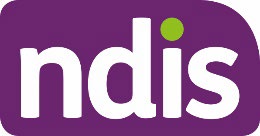
FOI 23/24-1239
OFFICIAL
Knowledge Article
For Internal Use Only
Refer to the Australian Music Therapy Association for more information.
Occupational therapist
Occupational therapists (OTs) work with people to teach them how to be as independent as
possible with their everyday tasks. This can include taking care of themselves, working,
volunteering and participating in hobbies, interests and social events. They support people to
build knowledge and skil s, modify existing skil s, find new ways of doing activities, and to
manage change.
OTs can also prescribe assistive technology supports like wheelchairs, shower chairs and
scooters, and can make recommendations on home or vehicle modifications if required.
Refer to the Occupational Therapy Australia for more information.
Orientation and Mobility Specialist
Orientation and Mobility Specialists (O&MS) work primarily with people who are blind or have
low vision to learn skil s that enable them to move as independently as possible in a range of
indoor and outdoor environments. An O&MS supports participants to build on their confidence,
knowledge and skil s which can include the use of mobility aids, orientation to a range of
environments, vision education and development of sensory awareness.
O&MS’s can equip participants with the skil s and concepts they need to move safely and
confidently through their chosen environment, be it moving within their home, getting to school,
using public transport for work or recreation purposes, or generally accessing the community.
Refer to Orientation and Mobility Association of Australasia for further information.
Orthoptist
Orthoptists work with people of all ages who have vision loss due to an eye condition or
neurological involvement that causes difficulty understanding what is seen. Orthoptists provide
participants with knowledge about how their vision works and support participants to build
skil s to enhance their functional vision for everyday activities. They are experts in helping
V2.0 2023-09-22
Guide - Therapy supports Appendix A 229732478
Page 3 of 7
This document is uncontrolled when printed
OFFICIAL
Page 10 of 14
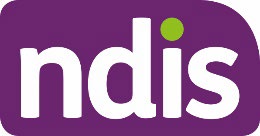
FOI 23/24-1239
OFFICIAL
Knowledge Article
For Internal Use Only
participants to use their vision to improve independence and confidence to live the life they
choose.
Orthoptists either modify the existing ways in which participants use their vision, or develop
new strategies that help people partake in activities and manage change. They do this by
providing therapy training to help improve the way participants optimise their remaining vision.
This may include eccentric viewing training to help utilise peripheral vision, or scanning training
to help navigate through their environment or easily locate objects.
Orthoptists can also make various recommendations for assistive equipment to assist with
near and distance vision including electronic or portable magnification devices, equipment that
utilises optical character recognition, lighting enhancement and glare control. Refer to
Orthoptics Australia for more information.
Physiotherapist
Physiotherapists assess, diagnose, treat, and prevent a wide range of health conditions and
movement disorders affecting the muscles and/or bones. For example, they help repair
damage, reduce stiffness and pain, increase mobility and improve quality of life.
Refer to the Australian Physiotherapy Association for more information.
Podiatrist
Podiatrists assess, diagnose, treat and manage conditions of the feet, ankles and legs. They
also provide rehabilitation for people when they have medical and surgical conditions which
affect their lower limbs. A podiatrist may prescribe foot orthoses to provide pressure
distribution to treat and prevent corns, calluses and ulcers.
Refer to the Australian Podiatry Association for more information.
Prosthetists/orthotists
V2.0 2023-09-22
Guide - Therapy supports Appendix A 229732478
Page 4 of 7
This document is uncontrolled when printed
OFFICIAL
Page 11 of 14
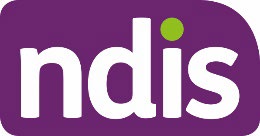
FOI 23/24-1239
OFFICIAL
Knowledge Article
For Internal Use Only
Prosthetists/orthotists assess and treat the physical and functional limitations caused by
il nesses and/or disabilities including limb amputations. They can prescribe, design, fit, and
monitor prostheses or orthoses.
The easiest way to explain the difference between a prosthetist and an orthotist is:
• a prosthetist works with devices designed to
replace a limb or another part of the body
• an orthotist works with devices designed to
assist a limb or another part of the body.
A prosthetic device is used to replace a person’s limb entirely (for example, foot, leg or arm)
while an orthotic device is used to enhance/support a person’s limb or other body part (for
example, spinal braces, leg splints or foot supports).
Refer to the Australian Orthotic Prosthetic Association for more information.
Psychologist
A psychologist is a person who is trained in the science and profession of how people think,
behave and learn. Psychologists work with people, and often their families, to help them make
desired changes to behaviours. For example, to overcome relationship problems, anger
issues, substance abuse or provide strategies to better manage a person’s mental health
disorders (for example, anxiety, depression, eating disorders or bipolar disorder).
Refer to the Australian Psychological Society for more information.
Speech Pathologist
A speech pathologist can diagnose and treat communication disorders. This includes
supporting those who have difficulties with speaking, listening, understanding language, social
skil s and stuttering. They work with people to help improve communication using their voice or
through assistive technology (for example, Picture Exchange Communication Symbols, talking
buttons). They can also help people who experience difficulties swallowing food and drink
safely.
Refer to the Speech Pathology Australia for more information.
Speech Pathologists can support NDIS participants with Disability Related Health Supports.
For further information refer to Our Guideline - Dysphagia supports.
V2.0 2023-09-22
Guide - Therapy supports Appendix A 229732478
Page 5 of 7
This document is uncontrolled when printed
OFFICIAL
Page 12 of 14
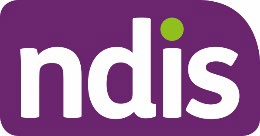
FOI 23/24-1239
OFFICIAL
Knowledge Article
For Internal Use Only
Allied Health Assistants
Al ied health assistants (AHAs), also known as therapy assistants, work under the supervision
of AHPs. AHAs can have a range of skil s and qualifications. These include TAFE certificates,
working towards a qualification in an AHP discipline, experience working in specific areas and,
in remote or rural areas, AHAs may receive on the job training.
AHAs assist with less complex clinical and non-clinical tasks. These tasks wil vary based on
the AHA’s experience, knowledge and skil level. Some of the tasks include but are not limited
to; assisting with therapy or exercise programs, implementing a therapy program developed by
the AHP, supporting and supervising activities of daily living and working towards
independence goals.
Article labels – internal use only
PACE user role names
Add: User role name label
Delete: User role name label
No change.
Topics
Add: Topic label
Delete: Topic label
No change.
Case names
Add: Case name label
Delete: Case name label
No change.
Ownership
Add: Ownership label
Delete: Ownership label
No change.
V2.0 2023-09-22
Guide - Therapy supports Appendix A 229732478
Page 6 of 7
This document is uncontrolled when printed
OFFICIAL
Page 13 of 14
